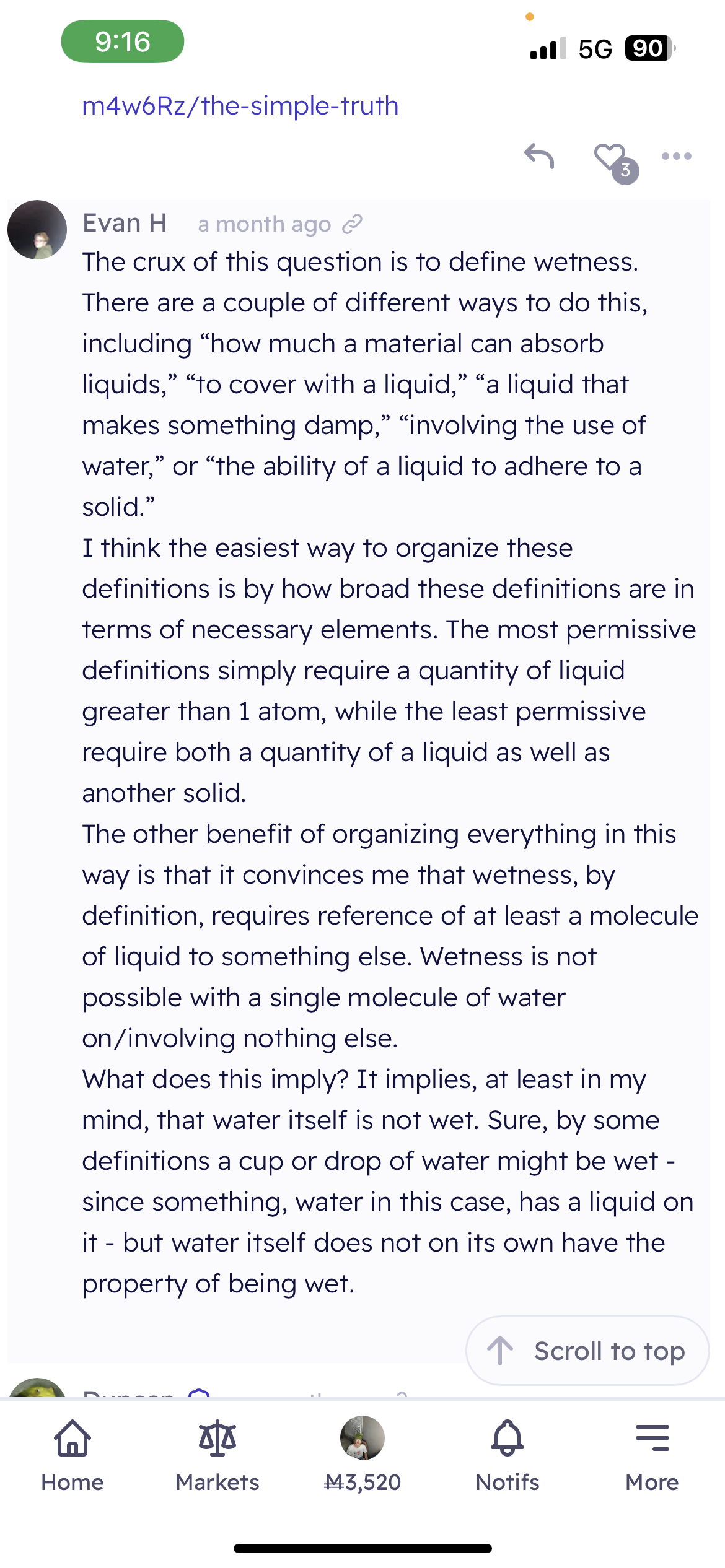I'll resolve this once a valid argument is given in the comments
🏅 Top traders
| # | Name | Total profit |
|---|---|---|
| 1 | Ṁ2,790 | |
| 2 | Ṁ348 | |
| 3 | Ṁ259 | |
| 4 | Ṁ255 | |
| 5 | Ṁ248 |
@Mqrius How was ChatGPT primed prior to this, though? Or how many tries did it take? Because water is slippery to the touch, maybe not as definitely “moist” to many but slippery? Fight me 😁
@degtorad I haven't primed it with anything, this is a fresh chat, first try! Feel free to try it yourself, I think it would be pretty consistent.
A part of me is not me. Part ≠ Whole.
However, a molecule of water is as aquatic as an ocean of water. Thus water is indeed covered with water.
Also, 'to be covered with liquid' is only part of the first definition. Again, Part ≠ Whole. It is incorrect if it is incomplete.
Wet is 'covered with or containing water'. Water contains itself. A set is a subset of itself.
Another definition of wet is of a liquid not yet dry, e.g., wet ink, wet paint. Water is not dry, therefore it is wet.
A wet region allows the sale of alcohol. Water, lakes, rivers, or oceans do not forbid, but allow the sale of alcohol. It is indeed wet.
“Water is wet” is a common idiom that means “you’ve just said something obvious”. Hard to think of stronger evidence that the meaning of “wet” is such that water is wet. The phrase would make no sense otherwise
@Rodeo That could be a strong evidence but unfortunately there are troves of fixed sentences, or patterns of sentences, that are deemed obvious and nonetheless they’re either false or, after first glance, denote too many different situations many of which make them false. So despite looking nice it’s a second-hand evidence argumented “from language applicability”.
@degtorad Sure, but there's no basis for overturning the ordinary usage of "wet". There's no falsehood. It's not like people who say "water is wet" are unaware of some fact or confused about something. It's not like people who utter that sentence have never actually felt or seen water, and would change their mind upon doing so. On the contrary, usage by competent English speakers unambiguously indicates that "wet" can be used to describe things that (roughly) have water or moisture and also to describe water itself. If the use of "wet" in some scientific contexts doesn't technically apply to water, that doesn't mean anyone is saying a falsehood when they say "water is wet".
@Jotto999 I think this is decisive. https://manifold.markets/GiftedNater/is-water-wet#P7Y4Ncc0wuzRFepGiJAR
@GiftedNater Wetness is the ability of a liquid to adhere to the surface of a solid, so when we say that something is wet, we mean that the liquid is sticking to the surface of a material.
Since water by itself is not a material on which it can be adhered and altered by the presence of more water, it is not wet.
@WeatherIsNiceUpHere Well of course liquid water is a material to which it is automatically adhered if we aren’t considering just disjointed aggregates of ~tens of molecules (and a couple molecules of anything isn’t probably okay to call a material, so water won’t be an exception here).
@WeatherIsNiceUpHere Interestingly, sufficiently cold water ice is probably suited to be called dry. Ice of about 0°C though is undeniably wet to me, in most circumstances.
@WeatherIsNiceUpHere so if you pour a bucket of water on my dry tshirt, does the tshirt not become wet, when it was not so before?
@WeatherIsNiceUpHere counterexample: if I leave a can of paint out in the rain and it gets water in it, "oh no, my paint got wet :(" is a valid negative exclamation describing the situation, despite the paint still being a liquid


